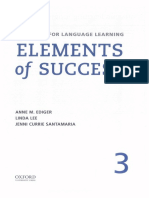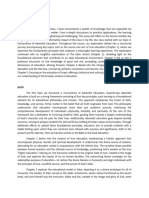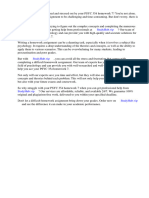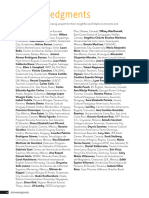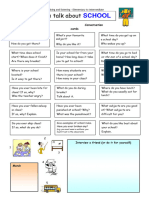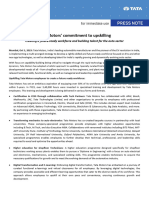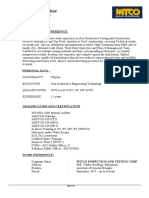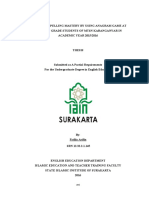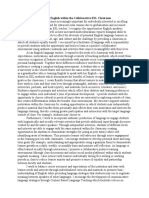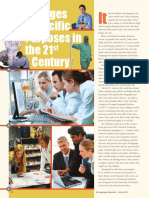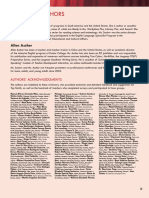StartUp 7 SB
Uploaded by
piprisetradinStartUp 7 SB
Uploaded by
piprisetradinStartUp
Ken Beatty, Series Consultant
Linda L. Lane
Paul MacIntyre
Nancy Blodgett Matsunaga
Jenni Currie Santamaria
Geneva Tesh
ii
StartUp 7
Copyright © 2020 by Pearson Education, Inc.
All rights reserved. No part of this publication may be reproduced, stored in a retrieval system, or transmitted in any form or by any
means, electronic, mechanical, photocopying, recording, or otherwise, without the prior permission of the publisher.
Pearson, 221 River Street, Hoboken, NJ 07030
Staff credits: The people who made up the StartUp team representing editorial, production, and design are Gregory Bartz,
Peter Benson, Magdalena Berkowska, Stephanie Callahan, Jennifer Castro, Tracey Munz Cataldo, Dave Dickey, Gina DiLillo,
Irene Frankel, Christopher Leonowicz, Bridget McLaughlin, Kamila Michalak, Laurie Neaman, Katherine Sullivan,
Claire Van Poperin, Joseph Vella, Peter West, and Autumn Westphal.
Cover credit: Front cover: Javier Osores/EyeEm/Getty Images. Back cover: Klaus Vedfelt/Getty Images (Level 1); Alexandre Moreau/
Getty Images (Level 2); Matteo Colombo/Getty Images (Level 3); Javier Osores/EyeEm/Getty Images (Level 4); Liyao Xie/Getty
Images (Level 5); Ezra Bailey/Getty Images (Level 6); guvendemir/Getty Images (Level 7); Yusuke Shimazu/EyeEm/Getty Images
(Level 8); tovovan/Shutterstock (icons)
Text composition: emc design ltd
Library of Congress cataloging-in-publication data on file.
Photo and illustration credits: See pages 167–168
Printed in the United States of America
ISBN-10: 0-13-468421-4 ISBN-10: 0-13-517840-1 (with app and Online Practice)
ISBN-13: 978-0-13-468421-5 ISBN-13: 978-0-13-517840-9 (with app and Online Practice)
ScoutAutomatedPrintCode ScoutAutomatedPrintCode
iii
ACKNOWLEDGMENTS
We would like to thank the following people for their insightful and helpful comments and
suggestions.
Maria Alam, Extension Program-Escuela Japan; Steve Kirk, Nippon Medical School,
Americana, San Salvador, El Salvador; Milton Tokyo, Japan; Jill Landry, GEOS Languages
Ascencio, Universidad Don Bosco, Soyapango, Plus, Ottawa, Canada; Tiffany MacDonald,
El Salvador; Raul Avalos, CALUSAC, Guatemala East Coast School of Languages, Halifax,
City, Guatemala; Adrian Barnes, Instituto Canada; Angélica Chávez Escobar Martínez,
Chileno Norteericano, Santiago, Chile; Laura Universidad de León, León, Guanajuato,
Bello, Centro de Idiomas Xalapa, Universidad México; Renata Martinez, CALUSAC,
Veracruzana, Xalapa, México; Jeisson Alonso Guatemala City, Guatemala; Maria Alejandra
Rodriguez Bonces, Fort Dorchester High Mora, Keiser International Language Institute,
School, Bogotá, Colombia; Juan Pablo San Marcos, Carazo, Nicaragua; Alexander
Calderón Bravo, Manpower English, Santiago, Chapetón Morales, Abraham Lincoln School,
Chile; Ellen J. Campbell, RMIT, Ho Chi Minh Bogotá, Colombia; José Luis Castro Moreno,
City, Vietnam; Vinicio Cancinos, CALUSAC, Universidad de León, León, Guanajuato,
Guatemala City, Guatemala; Viviana Castilla, México; Yukari Naganuma, Eikyojuku
Centro de Enseñanza de Lenguas Extranjeras for English Teachers, Tokyo, Japan; Erina
UN, México; Carlos Celis, Cel.Lep Idiomas S.A., Ogawa, Daito Bunka University, Tokyo, Japan;
São Paulo, Brazil; Bernal Cespedes, ULACIT, Carolina Zepeda Ortega, Let’s Speak English,
Tournón, Costa Rica; Carlos Eduardo Aguilar Cancún, México; Lynn Passmore, Vancouver
Cortes, Universidad de los Andes, Bogotá, International College, Vancouver, Canada;
Colombia; Solange Lopes Vinagre Costa, Noelle Peach, EC English, Vancouver, Canada;
Senac-SP, São Paulo, Brazil; Isabel Cubilla, Ana-Marija Petrunic, George Brown College,
Panama Bilingüe, Panama City, Panama; Victoria Toronto, Canada; Romina Planas, Centro
Dieste, Alianza Cultural Uruguay-Estados Cultural Paraguayo Americano, Asunción,
Unidos, Montevideo, Uruguay; Francisco Paraguay; Sara Elizabeth Portela, Centro
Domerque, Georgal Idiomas, México City, Cultural Paraguayo Americano, Asunción,
México; Vern Eaton, St. Giles International, Paraguay; Ana Carolina González Ramírez,
Vancouver, Canada; Maria Fajardo, Extension Universidad de Costa Rica, San José, Costa
Program-Escuela Americana, San Salvador, Rica; Luz Rey, Centro Colombo Americano,
El Salvador; Diana Elizabeth Leal Ffrench, Bogotá, Colombia; Octavio Garduno
Let’s Speak English, Cancún, México; Rosario Ruiz, AIPT Service S.C., Coyoacán, México;
Giraldez, Alianza Cultural Uruguay-Estados Amado Sacalxot, Colegio Lehnsen Americas,
Unidos, Montevideo, Uruguay; Lourdes Patricia Guatemala City, Guatemala; Deyvis Sanchez,
Rodríguez Gómez, Instituto Tecnológico de Instituto Cultural Dominico-Americano, Santo
Chihuahua, Chihuahua, México; Elva Elizabeth Domingo, Dominican Republic; Lucy Slon, JFK
Martínez de González, Extension Program- Adult Centre, Montreal, Canada; Scott Stulberg,
Escuela Americana, San Salvador, El Salvador; University of Regina, Regina, Canada; Maria
Gabriela Guel, Centro de Idiomas de la Normal Teresa Suarez, Colegios APCE, San Salvador,
Superior, Monterrey, México; Ana Raquel El Salvador; Daniel Valderrama, Centro
Fiorani Horta, SENAC, Ribeirão Preto, Brazil; Colombo Americano, Bogotá, Colombia;
Carol Hutchinson, Heartland International Kris Vicca, Feng Chia University, Taichung,
English School, Winnipeg, Canada; Deyanira Taiwan; Sairy Matos Villanueva, Centro de
Solís Juárez, Centro de Idiomas de la Normal Actualización del Magisterio, Chetumal, Q.R.,
Superior, Monterrey, México; Miriam de México; Edith Espino Villarreal, Universidad
Käppel, Colegio Bilingüe El Prado, Guatemala Tecnológica de Panama, El Dorado, Panama;
City, Guatemala; Ikuko Kashiwabara, Osaka Isabela Villas Boas, Casa Thomas Jefferson,
Electro-Communication University, Neyagawa, Brasília, Brazil
ACKNOWLEDGMENTS iii
iv
LEARNING OBJECTIVES
WELCOME UNIT
page 2 In the classroom | Learn about your book | Learn about your app
Unit Vocabulary Language Choices Conversation / Speaking Listening
• Words related to • Present perfect vs. • Talk about travel plans • Listen to a podcast
1 travel planning simple past about space
• Talk about space
What’s over • Indefinite pronouns exploration exploration
there? • Types of adverbs • Discuss urban exploration Listening Skill Listen
page 5 for stressed words
Conversation Skill Share
your ideas informally
• Superpowers • Present and future • Talk about superpowers • Listen to a podcast
2 unreal conditional about how to
• Talk about how to excel
What’s your • Future real excel
• Discuss why we love
superpower? conditional superheroes Listening Skill Listen
page 17 • Present real for sequence
conditional Conversation Skill Accept
an opinion before offering
a conflicting one
• Words related to • Verb + gerund vs. • Talk about what a • Listen to a podcast
3 accomplishments infinitive genius is about fictional
How’d you • Gerund usage • Talk about fictional worlds worlds
come up • Verb + object + • Talk about different Listening Skill
with that? infinitive senses Listen for definitions
signaled by pauses
page 29 Conversation Skill Defend
arguments informally
• Words to describe • Articles for general • Talk about animal videos • Listen to a podcast
4 unusual things and specific nouns about animal
• Discuss animal
Are you • Quantifiers with personalities personalities
an animal singular vs. plural • Discuss animal behavior Listening Skill
person? verbs Summarize
• Articles for known Conversation Skill Use
page 41 circumlocution when you
and unknown
information don’t know a word
• Words related to • Reported speech • Talk about starting a small • Listen to a podcast
5 starting a business patterns business about inventions
Is this going • Changes in • Talk about inventions Listening Skill
to work? reported speech • Talk about a success story Selective attention
page 53 • Common reporting
verbs Conversation Skill Show
interest in a conversation
iv LEARNING OBJECTIVES
v
Pronunciation Video Talk / Discussion Reading Writing Problem Solving
• Rhythm and • Listen to or watch a • Read about • Write a descriptive • Consider how to
stress patterns talk about abandoned deep-sea essay reduce vandalism
places exploration at famous sites
Writing Skill Use around the world
Note-taking Skill Make Reading Skill active verbs
lists Identify metaphor
Discussion Skill Invite
others to participate
• Pausing and • Listen to or watch a • Read about • Write a definition • Consider how to
intonation in talk about why we love technological essay reduce cheating
transitional superheroes superpowers among athletes
phrases Writing Skill Use
Note-taking Skill Note Reading Skill Use rhetorical questions
examples clearly a KWL chart
Discussion Skill Return
a discussion back to the
main point
• Pronouncing to • Listen to or watch a talk • Read about • Write an opinion • Consider whether
in infinitives about synesthesia creativity- essay reading escapist
boosting ideas literature leads
Note-taking Skill Note Writing Skill Refer to to problems in
unfamiliar names and Reading Skill outside sources society
words Annotate the text
Discussion Skill
Summarize ideas to focus
the conversation
• Reductions • Listen to or watch a talk • Read about • Write a persuasive • Consider how
in quantifier about animal behavior animals that use essay to avoid the
phrases language spread of invasive
Note-taking Skill Identify Writing Skill Use species
a speaker’s key examples Reading Skill strong, emotional
Recognize language
Discussion Skill Tell an definitions
anecdote
• Sentence stress • Listen to or watch a talk • Read about • Write an online • Consider how
in conversations about a success story alternative foods review entrepreneurs
could get new
Note-taking Skill Use Reading Skill Writing Skill Use ideas to market
Cornell Notes Paraphrase titles and subtitles faster
Discussion Skill Build on
what others have said
LEARNING OBJECTIVES v
vi
Unit Vocabulary Language Choices Conversation / Speaking Listening
• Words related • Subject-verb • Talk about compensation • Listen to a podcast
6 to work and agreement: Review about the gender
• Talk about the gender
Can I have compensation and expand pay gap pay gap
a raise? • Probability and • Discuss wealth inequality Listening Skill Infer
certainty in the goals
page 65
future Conversation Skill Add
• Expressing future comments to soften an
time opinion
• Words related to • Passive voice: Form • Talk about making a • Listen to a podcast
7 social advocacy and use difference about citizen
What are • Passive voice: • Talk about citizen journalism
you going to Reporting journalism Listening Skill
do about it? structures • Discuss the impact of Tone of voice
page 77 • Passive infinitives social media
and causatives
Conversation Skill Identify
gaps between thought
groups
• Marketing words • Modifying relative • Talk about a solution to • Listen to a podcast
8 clauses a problem about promotional
What’s our • Participle clauses • Talk about promotion strategies
story? • Infinitive clauses strategies Listening Skill
page 89 • Talk about corporate Anticipate words
origin stories
Conversation Skill
Speculate about the future
• Athletic abilities • Modals for • Talk about athletic • Listen to a podcast
9 speculation and competition about esports
Do you expectation • Talk about esports Listening Skill Infer
follow any • Expressing • Talk about what a sport is the target audience
sports? necessity and
obligation Conversation Skill Build
page 101 empathy with active
• Permission, strong
advice, and listening
prohibition
• Phrasal verbs for • Future in the past • Talk about a life-changing • Listen to a podcast
10 talking about life decision about memoirs
• Past perfect and
Remember events past perfect • Talk about a memoir Listening Skill
when? continuous • Discuss life in the past Comparisons
page 113 • Expressing the past:
Review Conversation Skill Maintain
interest with question tags
VOCABULARY / LANGUAGE CHOICES PRACTICE .............. page 125
GLOSSARY .................................................................................. page 155
vi LEARNING OBJECTIVES
vii
Pronunciation Video Talk / Discussion Reading Writing Problem Solving
• Stress in • Listen to or watch a talk • Read about a • Write a compare • Consider the
compounds about wealth inequality job market trend and contrast essay pros and cons of
getting additional
Note-taking Skill Use a Reading Skill Writing Skill Use education
KWL chart Recognize parallel structure
hedging
Discussion Skill
Acknowledge others’
contributions
• Pronunciation of • Listen to or watch a talk • Read about • Write a petition • Consider how to
–ate endings about the impact of environmental get more reliable,
social media solutions Writing Skill accurate news
Consider your
Note-taking Skill Include Reading Skill audience
key definitions and Create a process
examples flow chart
Discussion Skill Interrupt
politely
• Phrasal • Listen to or watch a talk • Read about • Write a personal • Consider the
prepositional about corporate origin deceptive essay consequences
verbs stories marketing of products not
Writing Skill Use lasting as long as
Note-taking Skill Listen Reading Skill Skim redundancy they used to
for restatement
Discussion Skill Ask
follow-up questions
• Expressions of • Listen to or watch a talk • Read about • Write a set of • Consider how to
necessity about what a sport is sports fans instructions limit the injuries
sports can cause
Note-taking Skill List a Reading Skill Writing Skill Write
series of arguments Understand like a reader
referential
Discussion Skill Express cohesion
strong opinions
• Auxiliary had • Listen to or watch a talk • Read about • Write a report • Consider how
and stress in past about life in the past memories to prevent
perfect Writing Skill Omit the world’s
Note-taking Skill Listen Reading Skill Use unnecessary languages from
for reasons a cause-and-effect information disappearing
T-chart
Discussion Skill Ask
rhetorical questions
Key
00-00 audio video ActiveTeach web search
LEARNING OBJECTIVES vii
viii
TO THE TEACHER
Welcome to StartUp
StartUp is an innovative eight-level, general American English course for adults and young adults
who want to make their way in the world and need English to do it. The course takes students
from CEFR A1 to C1 and enables teachers and students to track their progress in detail against
the Global Scale of English (GSE) Learning Objectives.
StartUp GSE CEFR Description StartUp GSE CEFR Description
Level Range Level Range
1 22–33 A1 Beginner 5 49–58 B1+ High intermediate
2 30–37 A2 High beginner 6 56–66 B2 Upper intermediate
3 34–43 A2+ Low intermediate 7 64–75 B2+ Low advanced
4 41–51 B1 Intermediate 8 73–84 C1 Advanced
English for 21st century learners Motivating and relevant learning
StartUp helps your students develop the spoken StartUp creates an immersive learning
and written language they need to communicate experience with a rich blend of multimedia
in their personal, academic, and work lives. videos and interactive activities; podcasts,
In each lesson, you help students build the interviews, and other audio texts for listening
collaborative and critical thinking skills so practice; humorous, engaging conversations
essential for success in the 21st century. StartUp with an international cast of characters for
allows students to learn the language in ways modeling conversation skills; high-interest
that work for them: anytime, anywhere. The video talks beginning at Level 5; media project
Pearson Practice English App allows students videos in Levels 1–4; presentation skills videos
to access their English practice on the go. in Levels 5–6; and problem-solving challenges
Additionally, students have all the audio and in Levels 7–8 for end-of-unit skills consolidation.
video files at their fingertips in the app and on
the Pearson English Portal.
Personalized, flexible teaching Access at your fingertips
The unit structure and the wealth of support StartUp provides students with everything
materials give you options to personalize the they need to extend their learning to their
class to best meet your students’ needs. StartUp mobile device. The app empowers students to
gives you the freedom to focus on different take charge of their learning outside of class,
strands and skills; for example, you can spend allowing them to practice English whenever
more class time on listening and speaking. You and wherever they want, online or
can choose to teach traditionally or flip the offline. The app provides practice
learning. You can teach sections of the lesson in of vocabulary, grammar, listening,
the order you prefer. And you can use the ideas and conversation. Students can
in the Teacher’s Edition to help you extend and go to any lesson by scanning a QR
differentiate instruction, particularly for mixed- code on their Student Book page
ability and for large and small classes. or through the app menu. The app
also provides students with access
to all the audio and video files from
the course.
viii TO THE TEACHER
Components LESSON 1 TALK ABOUT TRAVEL PLANS
Words related to travel planning
ESRA KARA
@EsraK
Going to Thailand this
3 CONVERSATION SKILL
01-04 Read the conversation skill. Listen. Notice
the words the speakers use to introduce an
opinion. Complete the sentences that you hear.
Share your ideas informally
You can introduce ideas and opinions
informally with expressions like these:
I’m telling you,… Here’s my advice.
That sounds…to me. Take it from me.
1 VOCABULARY
For the Teacher
summer. I’ve got so 1. , we should wait Just so you know,… Trust me.
much planning to do! for summer.
Look at the brochure. Who planned the last vacation you 2. like an awful lot of work .
took? How much was planned before you went?
3. You don’t want to go there during high season.
01-01 Read and listen. Notice the words in bold.
PAIRS Student A: Make a travel suggestion. Student B: Respond with an expression from
Here at Vista Travel we’ve got you covered, high the conversation skill box.
StartUp provides everything you need to plan, teach,
season or low season! Like to plan ahead? We can
work out a detailed itinerary for you—we’ll even
4 CONVERSATION
plan out all of your meals andday trips!
Prefer to play it by ear ? We can help you with 01-05 Listen. What do Esra and Mateo talk about?
that, too! We’ll keep it organized but open-ended ,
leaving you plenty of room for impromptu day trips 01-05 Listen again. Answer the questions.
monitor progress, and assess learning.
and serendipity! 1. Compare Esra’s and Mateo’s styles of vacation planning.
Take off with us! 2. How does Esra feel about Mateo’s style of vacation planning?
>> FOR PRACTICE, PAGE 125 / DEFINITIONS, PAGE 155 3. At the end of the conversation, what does Mateo recommend?
01-06 Listen. Complete the conversation.
2 LANGUAGE CHOICES Present perfect vs. simple past
Mateo: Well, : Just go for a walk and
Read the example sentences. Then complete the chart with Present perfect or Simple past. stop somewhere that looks good.
The StartUp ActiveTeach front-of-class tool allows you to
Present perfect example sentences Simple past example sentences
Esra: Yeah, that is not my style.
I have traveledto six countries. Last month, I traveled to six countries.
Mateo: Well, that’s how I found the best meal I’ve ever
Rob has gone on day trips every weekend. Rob went on day trips every weekend. eaten. I just trust that things will work out, and they
Have you ever doneanything spontaneous? Did you doanything spontaneous? usually do! Exploring is what makes travel fun!
I ’ve just finished planning the trip. Anna wanted to travel to Mexico. Esra: Hmm. I guess I’m not much of an explorer. That
.
• zoom in on the page to focus the class’s attention
Tourism in Peru has tripled in the past Tourism in Peru tripled in the past fifteen
fifteen years. years.
Present perfect vs. simple past
5 TRY IT YOURSELF
• a single action completed at a definite time in the past.
• a habitual / repeated action in the past that no longer continues. MAKE IT PERSONAL Which parts of a vacation do you plan? What do you prefer to leave open-
• use tools, like a highlighter, to emphasize specific text
is used for • an action or situation that started and ended in the past. ended? Think of reasons or examples from your travel experiences. Take notes in the chart.
• a state in the past that no longer applies. Hotels Tours Meals Museums
• a situation that started in the past and continues into the present. Plan? ( ✓ / ✗ )
• an action that happened at an unspecified time in the past that is still Reasons /
is used for relevant in the present. Examples
• an action that started in the past and ended very recently or at the
time of speaking.
• play all the audio texts and videos from the page
>> FOR PRACTICE, PAGE 125
Why does Speaker 1 use the present perfect while Speaker 2 uses the simple past? PAIRS Share your ideas. Use expressions from the conversation skill box to
Speaker 1: I’ve researched a lot of flights, but none of them work for me. introduce your opinions. Explain your reasons and give examples.
Speaker 2: I researched a lot of flights, but none of them worked for me.
I CAN TALK ABOUT TRAVEL PLANS.
• pop up interactive activities
6 UNIT 1 UNIT 1 7
• move easily to and from any cross-referenced pages LEARNING GOALS
1
In this unit, you
WHAT’S OVER talk about travel plans
talk about space
THERE? exploration
discuss urban exploration
The interleaved Teacher’s Edition includes
read about deep-sea
exploration
write a descriptive essay
• an access code to the Pearson Practice English App and
all digital resources
• language and culture notes
• teaching tips to help you improve your teaching practice
• Look for notes to help assess students’ performance GET STARTED
Read the unit title and learning goals. What does the
word exploration make you think of? ESRA KARA
@EsraK
• answer keys to all Student Book exercises
Look at the picture. Make a few quick notes to describe it and then I have traveling on the brain.
compare your ideas with a partner. How are your descriptions I love traveling, and I’m
similar or different? really looking forward to my
next fantastic adventure!
Read Esra’s message. What does she mean when she says she has
“traveling on the brain”? How does Esra’s message relate to the picture?
• and more!
5
Teacher’s Digital Resources, all available on the Pearson English Portal, include
• the Teacher Methodology • rubrics for speaking
Handbook and writing
• a unit walkthrough • hundreds of reproducible
• ActiveTeach front-of-class worksheets
software • answer keys for all practice
• ExamView assessment • audio and video scripts
software • the GSE Teacher
• teacher’s notes for every Mapping Booklet
Student Book page • the GSE Toolkit
For the Student
StartUp provides students with everything they need to extend their learning.
The optional MyEnglishLab for StartUp gives students more formal online
practice and provides immediate feedback, hints, and tips. It includes
• grammar practice (called Language Choices in StartUp 7 & 8 to
better reflect the level)
• vocabulary practice
• speaking and pronunciation activities
• listen-and-record practice that lets students record themselves and
compare their recordings to models
• auto-graded reading and writing practice that reinforces skills UNIT 1 HOW’S IT GOING?
LESSON 1 VOCABULARY
taught in the Student Book
C omplete the conversation . Use sentences f rom the box.
Nice to meet you, too . . My name is Ka te. Nice to meet you.
A: . I’m Tom.
T
• summative assessments that measure students’ mastery of listening, vocabulary,
B:
A:
B:
C omplete the conversations . rcle the cor rect response.
grammar, pronunciation, and reading
1. A: Hi . 4. A: Goodnight.
B: B:
a. Hello . a. See you tomorro .
b . Bye. b. F ine, thanks.
c. I’m fine. c. Hi.
2. A: How are you? 5. A: Good-bye.
• a gradebook, which records scores on practice and assessments, that both
B: B:
a. See you tomorrow. a. How are you?
b . Fine , thanks. b. Hell o.
c. Hi. c. See you la ter.
3. A: See you la ter. 6. A: How are you?
B: B:
students and you can use to help monitor progress and plan further practice
a. Good morning. a. F ine, ks. And you?
b . Hello . b. F ine, ks. Nice to meet you.
c. Good-bye. c. F ine, thanks. A re you?
omplete the c rossword puzzle.
A CROSS
2. Bye. Good .
The optional StartUp Workbook provides practice of vocabulary, grammar,
5. Good .
7. . a re you?
8. See you .
DOWN
1. I’m . T hank you.
3. Fine , . And you?
reading, and writing and includes self-assessments of grammar and vocabulary.
4. See you .
6. -bye.
Unit 1 1
TO THE TEACHER ix
2
WELCOME UNIT
1 IN THE CLASSROOM
Get to know your classmates
Talk to your classmates. Find someone who matches each prompt. Write his or her first name
on the line. Then ask follow-up questions.
• loves to read • can play a musical instrument
• has ridden a motorcycle • has traveled to another country
• enjoys cooking • is very artistic
A: Excuse me, do you love to read?
B: Yes, I do! My name is Onur. O-N-U-R.
A: Thanks! What kinds of things do you like to read?
Strategies for class and business discussions
Here are some examples of strategies that will help you overcome challenges in discussions
with classmates or colleagues. Complete the tips with the problems in the box.
doesn’t participate goes off topic speaks too softly
speaks too quickly speaks too much interrupts others
1. If someone doesn’t participate , invite him or her to join in by saying things like…
• “What do you think, Diego?”
• “We haven’t heard from Chiyo yet. What do you think about…?”
2. If someone , get him or her back on track by saying things like…
• “Let’s return to what Lanh was saying.”
• “That’s a good point, but let’s get back to the main issue.”
3. If someone is impatient and frequently , you can say…
• “Wait your turn, please. You’ll have a chance to talk in a moment.”
• “Hold on. Let Malik finish what he’s saying.”
4. If someone and others don’t have the opportunity to speak,
you can politely interrupt by saying…
• “Thank you, Noor. Now let’s hear what other people have to say.”
• “That’s an interesting idea. What do you think about that, Jae-jin?”
5. If someone , ask him or her to slow down by saying…
• “Would you mind slowing down?”
• “Could you say that a little more slowly, please?”
6. If someone , and others
have trouble understanding what is being said, get
him or her to speak up by saying…
• “Would you mind speaking up a little?”
• “I’m afraid we can’t hear what you’re saying.”
00-01 Listen. Check (✓) the strategies from 1B that you hear.
DISCUSS In groups, discuss the strategies in 1B. Which
ones are the most / least useful? Say why.
2 WELCOME UNIT
3
StartUp
2 LEARN ABOUT YOUR BOOK
1. Look at pages iv–vii. What information is on those
B2+ 64–75
pages? Ken Beatty, Series Consultant
Paul MacIntyre Nancy Blodgett Matsunaga Jenni Currie Santamaria
2. How many units are in the book?
3. How many lessons are in each unit?
kooB tnedutS pUtratS
4. Look at page 6, Language Choices. Where is the
practice?
5. Look at the QR code . Find it on page 7.
What does it mean?
6. Look at the I CAN STATEMENT . Find it on page 11.
What does it tell you? Pearson
Practice English
Online Practice and Resources
7. Look at this icon . Find it on page 13. What does
it mean?
3 LEARN ABOUT YOUR APP
1. Look inside the front cover. Where can you go to
download the Pearson Practice English App for
StartUp?
2. Where are the instructions for registering for
the app?
3. Look at the picture of the app. What do you see?
1
4. Look at the picture again. Fill in the blanks with
the numbers 1–3.
a. Number shows the practice activities. 2
b. Number shows the video files.
3
c. Number shows the audio files.
5. Look at the picture again. What does
mean?
6. Look at the QR code on page 7 again. What
happens when you scan the code?
WELCOME UNIT 3
4
MEET THE PEOPLE
OF TSW MEDIA To find out more, listen
to the introductions!
TSW Media is a big company with big ideas. It has offices all over the world. It works with
international clients to help them market their products and services.
TAE-HO KANG ESRA KARA
Videographer Computer programmer
00-02 Hello! My name is Tae-ho Kang. 00-05 Hi, everyone. My name is Esra Kara.
I live in Daegu, South Korea, where I work I live and work in Istanbul, Turkey, as a
as a videographer. computer programmer.
CARLA LUGO HIRO MATSUDA
Social media coordinator Project manager
00-03 Hi there! My name is Carla Lugo. 00-06 Hello! I’m Hiro Matsuda. I’m a
I’m a social media coordinator in the New York project manager. I grew up in Tokyo, but now
office. I live in New Jersey.
MATEO ROMERO KATE SANDS
Accountant Market researcher
00-04 Hey! I’m Mateo Romero. I was born and 00-07 Hi! I’m Kate Sands. I’m a market
raised in La Paz, Bolivia. I’m an accountant. researcher in Toronto.
Every year, TSW sponsors a competition for employees to get mentoring and coaching to improve
their public speaking skills. Here are three of the winners!
ADRIANA KENDRICK DAVID CRUZ
LOPEZ SCOTT
00-08 Hi. My name is 00-09 Hey! I’m Kendrick Scott, 00-10 Hi. My name is David
Adriana Lopez. I work in the and I’m a designer in the Cruz. I’m from Florida, but I’ve
technology department in Vancouver office. lived and worked in Singapore
the Quito office. for the past six years. I’m an
advertising manager.
4 WELCOME UNIT
5
LEARNING GOALS
1 WHAT’S OVER
In this unit, you
talk about travel plans
talk about space
THERE? exploration
discuss urban exploration
read about deep-sea
exploration
write a descriptive essay
GET STARTED
Read the unit title and learning goals. What does the
word exploration make you think of? ESRA KARA
@EsraK
Look at the picture. Make a few quick notes to describe it and then I have traveling on the brain.
compare your ideas with a partner. How are your descriptions I love traveling, and I’m
similar or different? really looking forward to my
next fantastic adventure!
Read Esra’s message. What does she mean when she says she has
“traveling on the brain”? How does Esra’s message relate to the picture?
5
LESSON 1 TALK ABOUT TRAVEL PLANS
ESRA KARA
@EsraK
1 VOCABULARY Words related to travel planning Going to Thailand this
summer. I’ve got so
much planning to do!
Look at the brochure. Who planned the last vacation you
took? How much was planned before you went?
01-01 Read and listen. Notice the words in bold.
Here at Vista Travel we’ve got you covered, high
season or low season! Like to plan ahead? We can
work out a detailed itinerary for you—we’ll even
plan out all of your meals and day trips!
Prefer to play it by ear? We can help you with
that, too! We’ll keep it organized but open-ended,
leaving you plenty of room for impromptu day trips
and serendipity!
Take off with us!
>> FOR PRACTICE, PAGE 125 / DEFINITIONS, PAGE 155
2 LANGUAGE CHOICES Present perfect vs. simple past
Read the example sentences. Then complete the chart with Present perfect or Simple past.
Present perfect example sentences Simple past example sentences
I have traveled to six countries. Last month, I traveled to six countries.
Rob has gone on day trips every weekend. Rob went on day trips every weekend.
Have you ever done anything spontaneous? Did you do anything spontaneous?
I’ve just finished planning the trip. Anna wanted to travel to Mexico.
Tourism in Peru has tripled in the past Tourism in Peru tripled in the past fifteen
fifteen years. years.
Present perfect vs. simple past
• a single action completed at a definite time in the past.
• a habitual / repeated action in the past that no longer continues.
is used for • an action or situation that started and ended in the past.
• a state in the past that no longer applies.
• a situation that started in the past and continues into the present.
• an action that happened at an unspecified time in the past that is still
relevant in the present.
is used for
• an action that started in the past and ended very recently or at the
time of speaking.
>> FOR PRACTICE, PAGE 125
Why does Speaker 1 use the present perfect while Speaker 2 uses the simple past?
Speaker 1: I’ve researched a lot of flights, but none of them work for me.
Speaker 2: I researched a lot of flights, but none of them worked for me.
6 UNIT 1
You might also like
- Teaching Culture - Perspectives in Practice100% (8)Teaching Culture - Perspectives in Practice200 pages
- Research Questions in Language Education and Applied Linguistics PDF100% (2)Research Questions in Language Education and Applied Linguistics PDF814 pages
- Four Corners - Student Book 1b - Fourth Edition33% (3)Four Corners - Student Book 1b - Fourth Edition82 pages
- PATHWAY 2 Listening&Speaking Student's BookNo ratings yetPATHWAY 2 Listening&Speaking Student's Book240 pages
- Get Test Bank For Carbon Nanomaterias For Agrifood and Environmental Applicatios 1st Edition HQ File PDF DownloadNo ratings yetGet Test Bank For Carbon Nanomaterias For Agrifood and Environmental Applicatios 1st Edition HQ File PDF Download408 pages
- Verified PDF Download The World A History Volume 1 2nd Edition by Felipe Armesto Ebook and TestBank Bundle Fast Instant DownloadNo ratings yetVerified PDF Download The World A History Volume 1 2nd Edition by Felipe Armesto Ebook and TestBank Bundle Fast Instant Download407 pages
- Rush University Medical Center Review of Surgery 5. Ed. Edition Velasco Download100% (6)Rush University Medical Center Review of Surgery 5. Ed. Edition Velasco Download110 pages
- Optimizing Online English Language Learning and Teaching 1st Edition Maria-Del-Mar Suárez (Editor) Full AccessNo ratings yetOptimizing Online English Language Learning and Teaching 1st Edition Maria-Del-Mar Suárez (Editor) Full Access131 pages
- The Routledge Handbook of Language Learning and Teaching - Hayo Reinders Chun Lai, (Language Teacher) Pia Sundqvist - Taylor & Francis - 9780367499389 - Anna's ANo ratings yetThe Routledge Handbook of Language Learning and Teaching - Hayo Reinders Chun Lai, (Language Teacher) Pia Sundqvist - Taylor & Francis - 9780367499389 - Anna's A463 pages
- Statistics Informed Decisions Using Data 4th Edition Ebook and TestBank Bundle Fast AccessNo ratings yetStatistics Informed Decisions Using Data 4th Edition Ebook and TestBank Bundle Fast Access316 pages
- Fellowship in Forensic Odontology 2018 19No ratings yetFellowship in Forensic Odontology 2018 195 pages
- Community. Child Development Center (CCDC) Inc.: Weekly Home Learning PlanNo ratings yetCommunity. Child Development Center (CCDC) Inc.: Weekly Home Learning Plan6 pages
- Fabricio Chavarría CV Harvardstyle En-UsNo ratings yetFabricio Chavarría CV Harvardstyle En-Us4 pages
- (Ebook PDF) Sheltered Content Instruction: Teaching English Learners With Diverse Abilities 5th Edition Instant Download100% (1)(Ebook PDF) Sheltered Content Instruction: Teaching English Learners With Diverse Abilities 5th Edition Instant Download65 pages
- Academic Language Mastery Grammar and Syntax in ContextNo ratings yetAcademic Language Mastery Grammar and Syntax in Context105 pages
- 0world English Intro. Second Edition. Student's Book100% (1)0world English Intro. Second Edition. Student's Book175 pages
- Sheltered Content Instruction: Teaching English Learners With Diverse Abilities 5th Edition (Ebook PDF) PDF Download100% (4)Sheltered Content Instruction: Teaching English Learners With Diverse Abilities 5th Edition (Ebook PDF) PDF Download63 pages
- Jayme Adelson-Goldstein, Norma Shapiro - Oxford Picture Dictionary (Monolingual English) - Oxford University Press, USA (2008)No ratings yetJayme Adelson-Goldstein, Norma Shapiro - Oxford Picture Dictionary (Monolingual English) - Oxford University Press, USA (2008)288 pages
- Empowering The English Language Teacher in A Multipolar EnvironmentNo ratings yetEmpowering The English Language Teacher in A Multipolar Environment299 pages
- Academic Language Mastery - Culture in Context (2016)No ratings yetAcademic Language Mastery - Culture in Context (2016)113 pages
- Perspectives On Teaching Language and Content 9780300251999 0300251998 Compress100% (1)Perspectives On Teaching Language and Content 9780300251999 0300251998 Compress316 pages
- Curriculum Vitae John O. Oliver: Summary of ExperienceNo ratings yetCurriculum Vitae John O. Oliver: Summary of Experience4 pages
- For Teachers of English: Vol. 29 No. 1 - January/June 2022 ISSN 0120-5927No ratings yetFor Teachers of English: Vol. 29 No. 1 - January/June 2022 ISSN 0120-5927243 pages
- Byu-Idaho Students Join Fight For A Good CauseNo ratings yetByu-Idaho Students Join Fight For A Good Cause4 pages
- World English 2B Level A2 Teenager (1) OCRNo ratings yetWorld English 2B Level A2 Teenager (1) OCR161 pages
- Improving Spelling Mastery by Using Anagram at The First Grade Students of MTSN KaragayarNo ratings yetImproving Spelling Mastery by Using Anagram at The First Grade Students of MTSN Karagayar92 pages
- Kathryn Pawelko - Teaching Philosophy - English 513 - FinalNo ratings yetKathryn Pawelko - Teaching Philosophy - English 513 - Final2 pages
- Language For Specific Purposes Apr13 - Article PDFNo ratings yetLanguage For Specific Purposes Apr13 - Article PDF4 pages
- Textbook of Natural Medicine 2 Volume Set 3rd Edition Joseph E. Pizzorno Jr. ND Download100% (2)Textbook of Natural Medicine 2 Volume Set 3rd Edition Joseph E. Pizzorno Jr. ND Download47 pages






